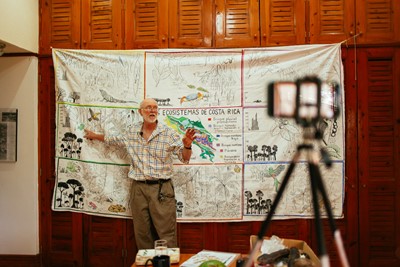Blog
Dialogues that legitimize violence against women: Part 1
November 25, 2018
By Kattia Castro
In the framework of the 25th of November, in which we demand the cessation of violence against women, I propose in this article to give evidence toward the prevalence of significantly pernicious imaginaries related to the normalization of violence, which impedes it being unmasked and transformed. In addition, I would like to denounce the complicity that historically has been constructed from theology and the Bible in relation to the types of violence that have been practiced against women. Of course something that I want to awaken in people is the responsibility and compromise that should be coming from all social “spaces” to propose alternatives to the persistent violence against women and to offer a counterweight to the present-day discourse and practices in our Costa Rican reality which perpetuate the historical complicity that has been constructed from the Bible and theology in the concealment and acceptance of the diverse forms of violence against women.
The first of the events that I am going to mention happened on August 2 of 2017 in Cartago. On that day the bishop of Limón Javier Román Arias was in charge of giving the homily in celebration of the Virgin of Los Angeles. In front of thousands of people present and many thousands more who listened to the transmission of his words through different radio and TV stations, the bishop exalted the value of those girls who decided not to suspend their pregnancy and to have their children, after having been “robbed of their innocence.” He singled out these girls as examples of people who said “yes to life in the womb.” And also as an example of the supernatural force of mothers, that is nothing less than the grace of God acting in their lives, pushing them always to give more of themselves, to be valiant and to conserve the faith in spite of the problems and difficulties. He emphasized at that time the value of women in maternity and “the non-negotiable and infinite value of human life.”
The priest explained that the Posada de Belén is a shelter located in Alajuela founded by the Catholic Church, to accompany and teach these adolescent mothers so that, once they turn 18, they can go off and lead successful lives with their little ones, and he indicated they hope to enlarge the capacity of the shelter to double or triple the occupancy, which today is 65 adolescents.
Faced with such an outpouring of misogyny on the bishop’s part, there is much to say and time is short. To start with, I will say that the value of women doesn’t stem exclusively from maternity, it stems from their humanity shared in ways equal to those of men. When have you heard of men being exalted for their paternity?
With legislation in hand, many people will take issue with what I say: Article 33 of the Political Constitution “All persons are equal before the law and no discrimination against their human dignity can be practiced.”
The Universal Declaration of human rights, article 1: “All human beings, born free and equal in their dignity and rights and so endowed with reason and conscience, ought to behave fraternally among themselves.
The Bible, in Genesis declares: “male and female were created in his image and similarity.” My opinion is that these declarations are not sufficient to guarantee equality and equity.
In today’s world we women are not treated as equals: the caregiving tasks continue being a burden on the backs of women in greater proportion and this is a primordial element so that, in a cascade effect, we are denied other rights: rest, study, a decent job, adequate remuneration, the use of public space. We continue being exposed to the physical and sexual violence in greater proportion than are men.
Excess work and patrimonial, verbal, and psychological violence leave us in a precarious condition for facing life and for guiding those people who are under our care: minors and the elderly, the latter often ill and with different degrees of special needs. This elemental fact that men and women are today “made of the same clay” continues to be systematically denied in day-to-day living. Some examples of this are: fewer women are in decision-making positions and rather are named to positions of popular representation; under employment and unemployment are still realities among women and for this reason the “feminization of poverty” is a blemish of the 21st century, just as it has been in past centuries, where the symbolic and economic resources have been monopolized and controlled by men.
Sexual harassment on the street is rebuilt in Costa Rican society, often disguised under the words “the culture of the compliment”; the whistles, cat calls, lascivious stares, the inappropriate comments, the pushing up against and groping, are all commonplace, as unfortunately is the rape of women of all ages.
We women are “obliged” to say “yes” to the lives of other people. This imperative is so strong and all-embracing that our own lives disappear in the face of the needs of others; sadly all too often our lives literally disappear. We women put off rest, tranquility, space, dreams, opinions, denouncements, leadership, health, food, pleasure on one day after another to satisfy the needs of other people and mold ourselves to fit others’ expectations, and in so doing wipe out our own.
The bishop didn’t even admit that those pregnant adolescents got that way because they were subjected to the sexual violence of men, who in most cases were individuals the girls knew. To the bishop, maternity is something natural and inherent to women, even though those affected may be girls, and ignoring the circumstances in which the pregnancy came about. When the bishop avoids using the term rape, and in place of it utilizes the expression “robbed of their innocence” he softens it and makes himself an accomplice to this sad reality that remains normalized and legitimized.
Turning our attention away from the rapists is not just a mere omission; with this strategy the aggressor gets off the hook. The bishop prefers to exalt these girls for their maternity, re-fortifying in this way the historic trap of enclosing women within a biological conditioning of the body. I agree that maternity can be seen as a gift, I see it as a possibility, a potential attainable by women. But when maternity becomes an obligatory and forced destiny, that’s when it becomes oppression and slavery.
Maternity ought to be freely elected by women as a part of their life project that happens within a context of love, adequate conditions to carry it out, government compromise to support it, and social responsibility to back it up. Reducing women to being a fertilized uterus is to deny fertility of the mind, of her thoughts, of her creations and dreams, of her possibilities to develop political, scientific, artistic, economic and sports-related proposals. On many occasions forced maternity extinguishes in women all of these possibilities. The possibilities of biological fecundity cannot asphyxiate the possibilities of intellectual, scientific and artistic fecundity.
What happens with the vehemence in the words of the bishop who exalts the value of life? Where is his severity in pointing to the culture of death constructed by the rapists? The silence of the bishop is shameful and it transforms him into an accomplice of the sexual violence against women and in this case against girls. This attitude of hiding the perpetrator and re-victimizing the victims is historic and needs to end. The rapists remain freed from their crime. Not even are their names mentioned, much less are they brought to justice and sanctioned, even if it be just morally, since many of them freely walk the streets of our communities and carry out mainstream lives.
The position of the bishop in covering up the offenders, the abuser, the hitter, those who pay no child support, those who abort their sons and daughters by fleeing elsewhere, this is the expression of our social blindness in the face of violence against women.
These same men that don’t assume their responsibilities are those that reappear again and again as the judges and executioners of women who have conscientiously decided to interrupt an unwanted pregnancy or one resulting from rape, and who shed doubt on the testimony of a woman who has the courage to denounce that she was raped. The position of the bishop, who in addition represents quite solidly the doctrine of the Catholic Church is a very clear alert of the institutional violence that goes by undetected because of its normalization around us.
This type of discourse has become commonplace each August 2, which turns the most important religious festivity of the country (a festivity centered on a woman) into a platform for religious discourses that are violent and that generate violence.
Read more on our next publication.

ICADS Partner Spotlight: Celebrating 30 years with Pitzer College
ICADS and Pitzer College celebrate and reflect on 30 years of working together in Study Abroad!
#COSTA RICA #ICADS ACADEMIC #NEWS #STUDY ABROAD

Alumni Newsletter
A few weeks ago, ICADS received an email from an alumnus from 1993, which was only a few years into the existence of the program. Hearing a little about this once student's experience and how ICADS changed the trajectory of their life rang familiar to us here, and we hope to celebrate that legacy and the mission that enables it.
#CULTURE #INTERNSHIP #STUDY ABROAD

A Year in Review: Change and Adaptation in 2020
As we approach one year since the COVID-19 pandemic began, we reflect on a year of change and adaptation, and we look forward to a new chapter in 2021!
#COSTA RICA #STUDY ABROAD #ICADS ACADEMIC #NEWS


